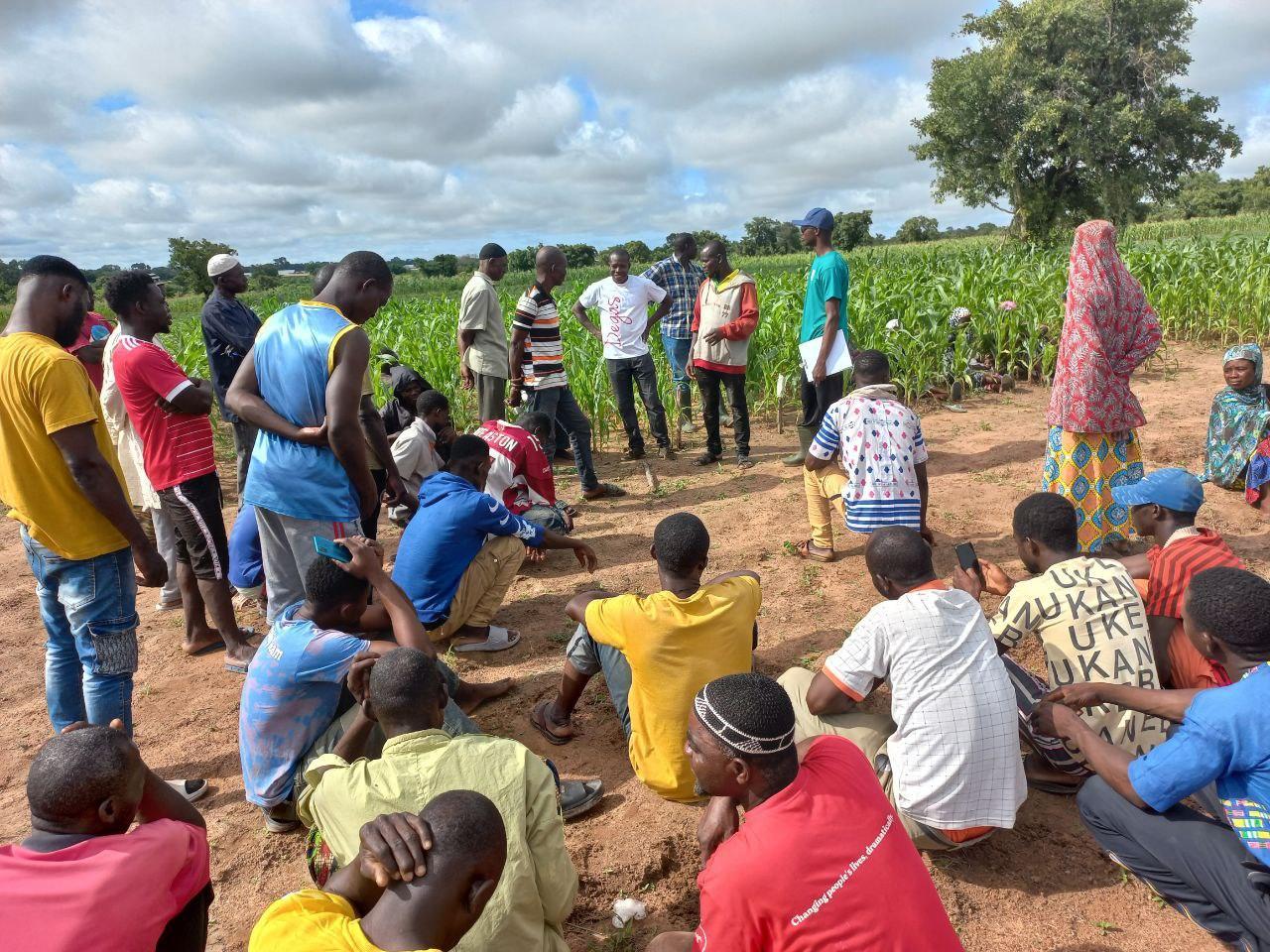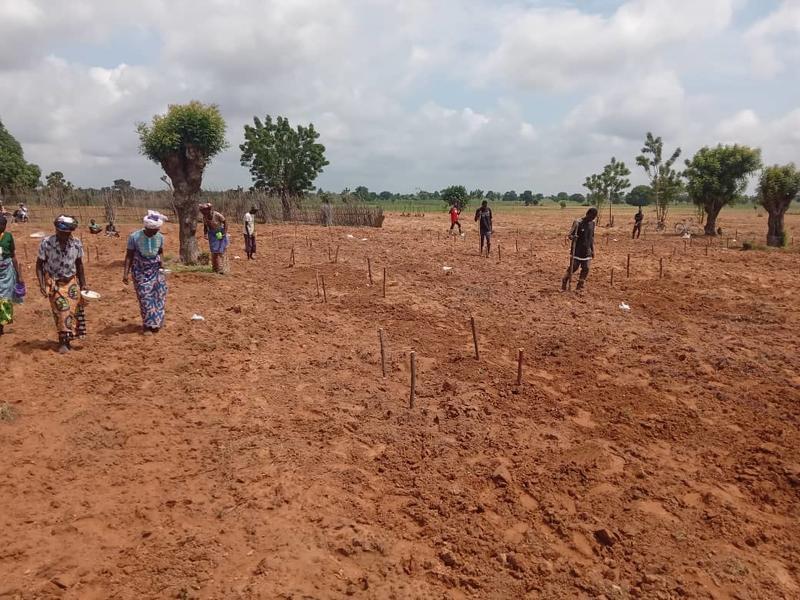Blog Enhancing Agricultural Resilience in Smallholder Farmers in Ghana

The CGIAR initiative 'Excellence in Agronomy' (EiA) established partnership between Degas, GAIP and Alliance of Bioversity International CIAT in Ghana since 2020 to develop and pilot BASKET-A (bundles of agronomic solutions, credit, and insurance) to improve productivity and reduce risk for Maize grower farmers.
By: Abdul-Latif Baamonyor, Wuletawu Abera, Powell Mponela, Isaac Boatey Akpatsu, and Jalaludeen Masoud
Excellence in Agronomy (EiA) initiative of the CGIAR is led by the Alliance, and strives to bring about significant agronomic improvements for smallholder farming households. In Ghana, EiA initiative is taking root through multiple use cases, one of which is led by the Alliance of Bioversity International and CIAT in collaboration with Ghana Agricultural Insurance Pool (GAIP) Ltd, and Degas Ltd with scientific backstopping from the Council of Scientific and Industrial Research’s (CSIR) Institute for Scientific and Technological Information (INSTI), Crop Research Institute (CRI) and Soil Research Institute (SRI). This specific use case aims to fortify agricultural sustainability and resilience, placing a strong emphasis on improving livelihoods of smallholder farmers. By employing a BASKET-A (Bundled Advisory Services Kits for Enabling Transformation Solutions for Agronomy) approach, which combines insurance with agroadvisory services encompassing fertilizer recommendations, cropping calendars, and good agronomic practices, this initiative has demonstrated remarkable enhancements in the productivity, profitability and climate resilience of smallholder farmers compared to traditional farming practices.
Towards tailored BASKET-A elements for impact
With the increasing risks related to food production due to climate change, the Ghana GAIP use case aims to improve insurance policies to reduce the risk smallholder farmers face, bundling that with quality input and agro-advisory. Our partners (GAIP and Degas) have expressed interest not only in the BASKET-A which is based on the current blanket recommendation and workflow but also expressed a strong demand for improved agricultural advisory services such as site-specific fertilizer recommendation, cropping Calanders, and variety-household-site specific insurance policy to benefit those who will be covered by crop insurance. This multi-faceted approach enhances the productivity of smallholder farmers and the risk management of insurers.
Increased access and use of site-specific agronomic solutions through demonstration and participatory validation across multiple sites
To address this demand and ensure the effectiveness of our approach, Alliance and parties have established 16 agronomic trials. These sites serve as validation grounds for existing recommendations, with a primary focus on fertilizer guidance and variety selection. This rigorous validation process forms a strong foundation for recommending tailored advisory services to farmers, reducing their risk exposure, and improving their overall productivity. Experiments have been established in sixteen sites in the guinea savannah zone, eight each in the Northern and Upper West regions, The experimental design comprises three varieties of maize, covering OPV and Hybrid, (Sanzalsima, Wang-Basig, and SC 719) and three level of fertilization rate were applied to refine and demonstrate the importance of site-specific fertilizer rate for optimal productivity.
Capacity Building of Farmers
One of the key learning events to enhance smallholder farmers' resilience is Farmers' Day. During these events, local farmers are invited to actively participate in evaluating the performance of different treatments, including crop varieties and fertilization regimes. Farmers have the unique opportunity to assess both the visual aspects and the overall performance of the entire field, gaining insights into how fertilization practices carried out during planting affect crop development. Farmers were actively engaged in practical training on fertilizer application techniques. They learn the significance of placing fertilizers 5 cm away from the plants and approximately 10 cm deep into the soil. This method optimizes the effectiveness of fertilizers while minimizing losses. This hands-on experience during Farmers' Day helps farmers appreciate the benefits of this approach. The feedback received has been positive. Farmers have acknowledged that fertilization at planting significantly contributes to ensuring the timely availability of essential nutrients for crops during their early growth stages. This fosters healthy root development, efficient nutrient uptake, and overall crop establishment. Furthermore, farmers actively participate in selecting their preferred crop varieties, providing detailed reasons for their choices. Their preference often leans towards Wang Basig, primarily due to its early maturation and the ability to produce two cobs per plant.
The Team

Wuletawu Abera
Senior Scientist, Country Representative for Ghana
Powell Mponela
Postdoctoral FellowWay forward
The journey to enhance agricultural resilience among smallholder farmers in Ghana is ongoing. The collaborative efforts of various stakeholders, rigorous validation, and interactive engagement with local farmers have yielded promising results. Through the strategic bundling of insurance and agro advisory services, smallholder farmers are better equipped to mitigate risks, optimize productivity, and build a more resilient agricultural future.

Farmers planting and applying fertilizer during trial establishment. Credit: Wuletawu Abera

Maize trial about 4 weeks old. Credit: Wuletawu Abera

Farmers at a trial site on the evaluation day. Credit: Wuletawu Abera
